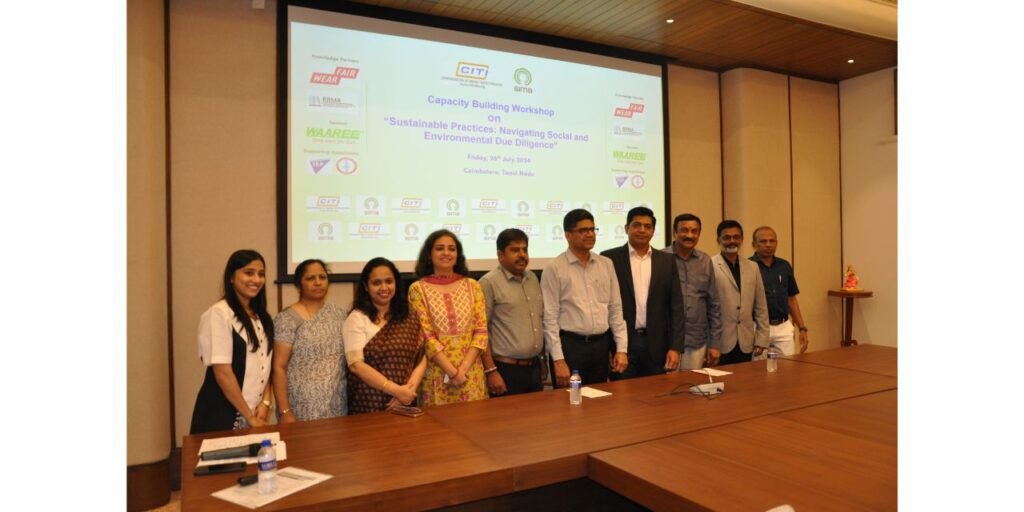
The Fair Wear Foundation and the Confederation of Indian Textile Industry (CITI) have signed a Memorandum of Understanding for a comprehensive one-year program on capacity building of Indian textile exporters on recognizing the future EU due diligence frameworks and bolstering suppliers’ opinions during the discussions. Corporate Sustainability Law was passed in May of 2024. The Due Diligence Directive (CSDDD) requires European businesses to adopt thorough environmental and human rights due diligence throughout the global supplier chain chains.
By creating a uniform legal framework across the EU, this regulation is anticipated to lessen the variety of reporting requirements while promoting equality of opportunity and legal clarity. Indian firms now have the chance to embrace human rights and procedures for environmental due diligence (HRDD), strengthening their position in negotiations and a deeper comprehension of their chances and hazards.
According to Sh. T Rajkumar, the immediate past chairman of CITI, “the CSDDD is a transformative development for the Indian textile and apparel sector.” Accepting this guideline will enable our sector to meet international standards and take advantage of common obligations with brands, have meaningful conversations with stakeholders, and deal with disparities in power.”
In keeping with this cooperative endeavor, on July 26 in Coimbatore, the Fair Wear Foundation and CITI organized a Capacity Building Workshop entitled “Sustainable Practices: Navigating Social and Environmental Compliances” in cooperation with SIMA.
2024.
Knowledge partners Fair Wear Foundation and Regulatory Representatives & Managers Association (RRMA) shared their perspectives at the session, emphasizing the role that chemical compliance plays in the textile value chain.
In terms of social due diligence, participants received instruction on the CSDDD’s effects on brands, as well as an overview of their environmental and due diligence duties and the specifics of the directive’s climate change mitigation strategy. Important meetings comprised talks about company duties related to brands, government oversight and punishment, and partner obligations and incorporating due diligence into business procedures.
The worldwide regulatory framework for chemical management in different nations has been discussed by RRMA, with a focus on how crucial it is to follow laws in order to safeguard the environment and public health. It covered certain laws, accountable authorities, duties of compliance, and the circular economy concepts and environmentally friendly methods of managing chemicals. There were insights given. investigating chemical compliance in the textile industry with an emphasis on legal requirements, Classification of dangerous substances, certification of sustainability, and the worldwide regulatory environment. It emphasizes how important certifications like GOTS, OEKO-TEX®❏, ZDHC, Blue Sign, Cradle to Cradle, and Eco Label are for encouraging eco-friendly practices in the textile sector.
In his Welcome Address, SIMA Chairman Dr. S.K. Sundararaman noted that the regulatory changes present chances to enhance the power dynamics between brands and suppliers as well as obstacles to be solved. show off our expertise in sustainable development and moral corporate conduct. He said that in order to assist the country’s mills in this region in adhering to the Social Regarding environmental regulations, SIMA established a “Sustainability Cell” to provide guidance to the members on a regular basis on the advancements by bringing in subject matter experts. He said that by working with the Internal Revenue Service, SIMA assists its members in adhering to the requirements of the Prevention of Sexual Harassment (POSH) Act. As a “External Member,” the members established the committee. For the benefit of female workers and stop their exploitation, SIMA as a preventative step, released a code of conduct for women that covers everything from engagement to selection. While working in the mills as “Recruitment” staff members in the dormitory or the day scholars Rules and Guidelines for Women’s Employment in the Textile Industry particularly for the employers to abide by labor regulations. In addition to publishing a code, SIMA signed a memorandum of understanding (MoU) with M/s. TUV Rheinland, an international third-party certification authority, to audit and provide the textile industry a star rating certificate. mills according to their adherence. He said that BSI and SIMA have signed an agreement. for an audit of compliance. Version 2.0 of the Code of Conduct was also created by SIMA to allow the members to fulfill the requirements of the buyer, including legal compliance, requirements for health, safety, and the environment, as well as recruiting policies and a code of behavior for migrant labor, women’s employment, and contract engagement labor in the textile sector.
